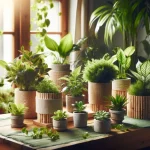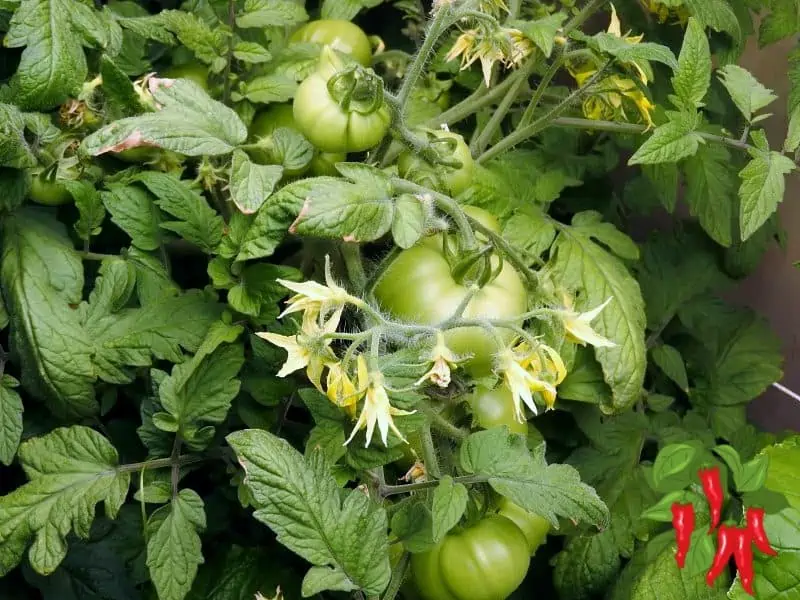This post may contain affiliate links. If you buy something from one of our links we may earn a commission. Thanks
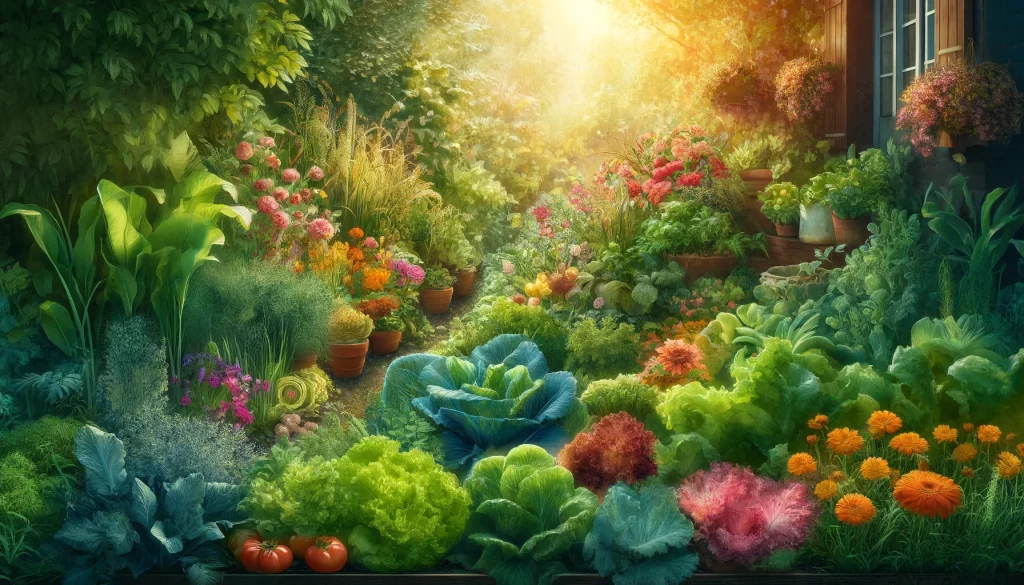
Are you curious about the benefits of gardening year-round? Imagine harvesting fresh veggies in the dead of winter or finding solace in your garden during every season.
Let’s dive into the endless rewards that year-round gardening can bring to your life!
Gardening Year-Round Key Takeaways
- Gardening year-round offers numerous benefits that include:
- Continuous fresh produce
- Improved physical and mental health
- A deeper connection to nature.
- It’s easier than you think and incredibly rewarding!
Introduction Benefits of Gardening Year-Round
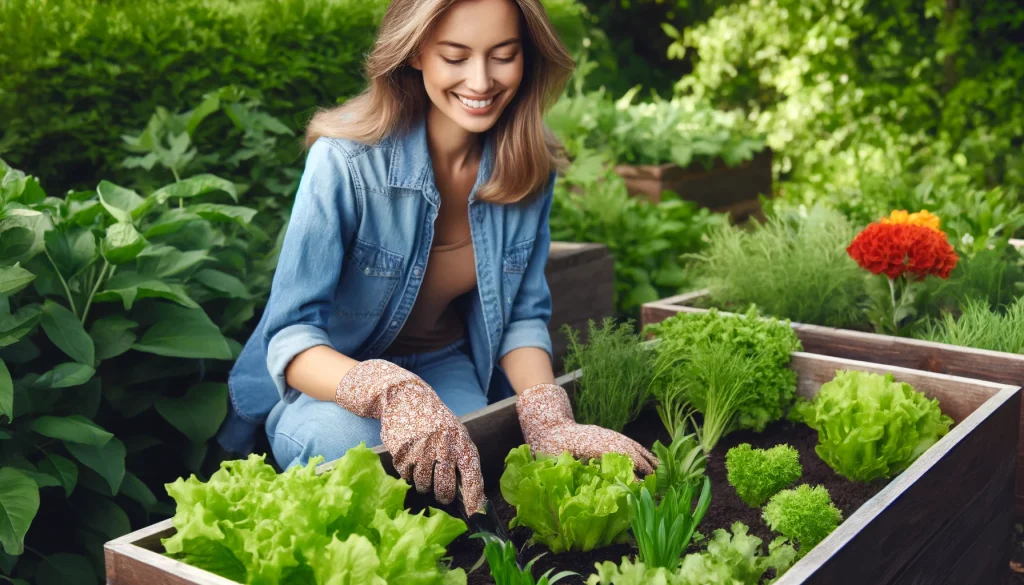
Have you ever wondered why some folks keep their gardens thriving even in winter? Year-round gardening isn’t just for show—it’s packed with perks.
Let’s dig into the joy and rewards of keeping your garden green through all four seasons!
Year-Round Gardening Overview
Gardening year-round means tending to your plants through every season, not just in spring and summer.
This approach allows you to enjoy fresh produce and blooming flowers even when the weather turns chilly.
By planning and using the right techniques, you can maintain a thriving garden all year long.
Benefits Throughout All Seasons
- Continuous Harvests: Enjoy fresh veggies and herbs without a seasonal break. Imagine picking a crisp salad in January!
- Improved Health: Regular gardening keeps you active, boosting both physical and mental well-being.
- Connection to Nature: Stay in tune with the natural world, observing seasonal changes and how they affect your plants.
- Stress Relief: Gardening is a great way to unwind and de-stress, no matter the time of year.
Planning for Year-Round Success
- Seasonal Planting: Choose plants that can thrive in different weather conditions. Cool-season crops like kale and carrots can grow well in colder months.
- Use of Tools: Cold frames, greenhouses, and row covers help protect plants from extreme weather, ensuring a steady harvest.
- Consistent Care: Spend a little time each day in your garden. Even a quick 15-minute walk-through can make a big difference.
1. Physical Health Benefits
Gardening year-round isn’t just good for your garden; it’s a fantastic way to boost your physical health too.
From getting your daily dose of exercise to soaking up essential vitamins, gardening keeps you fit and healthy in many ways.
Let’s dig deeper into how this rewarding hobby can benefit your body.
Exercise
Gardening as a Moderate-Intensity Exercise. Gardening is more than just a relaxing hobby—it’s a great workout! Here’s how it helps you stay in shape:
- Full-Body Workout: Gardening involves various physical activities like squats, lunges, lifting, digging, and raking. Each movement works different muscle groups, giving you a full-body workout. From pulling weeds to planting seeds, you engage your legs, arms, back, and core, making it an excellent way to stay fit.
- Burning Calories: The physical effort put into gardening can burn as many calories as a gym session. Tasks such as digging holes, raking leaves, and carrying bags of soil can be quite strenuous. On average, you can burn around 200-400 calories per hour of gardening, depending on the intensity of the tasks.
- Balance and Flexibility: Regular gardening helps improve your balance and flexibility. Bending, stretching, and lifting contribute to better overall physical fitness. Activities like reaching for tools or stepping around plants require coordination and help keep your joints flexible.
- Heart Health: The physical activity involved in gardening also promotes cardiovascular health. Gardening can get your heart rate up, improving circulation and reducing the risk of heart disease. It’s a natural way to keep your heart strong and healthy.
- Strength Building: Lifting pots, pushing wheelbarrows, and turning compost all help build muscle strength. These activities engage your major muscle groups, making gardening a practical and effective way to increase your muscle tone.
- Stress Relief and Mental Well-being: Physical exercise releases endorphins, which are natural mood lifters. Gardening provides this benefit, along with the added bonus of connecting with nature. The rhythmic and repetitive tasks of gardening can be meditative and help reduce stress.
Gardening isn’t just a one-time workout; it’s a consistent way to keep moving and stay active. Even a small garden can offer big benefits when it comes to your physical health.
Vitamin D Exposure Importance of Sunlight for Vitamin D Synthesis
Gardening year-round means plenty of time spent outdoors, which is fantastic for getting your daily dose of vitamin D. Here’s why sunlight and vitamin D are so important:
- Sunshine Benefits: Spending time outdoors in your garden means soaking up some sunshine, which is crucial for vitamin D production. Our bodies naturally produce vitamin D when our skin is exposed to sunlight, specifically UVB rays.
- Bone Health: Vitamin D is essential for bone health. It helps your body absorb calcium, which keeps your bones strong and reduces the risk of osteoporosis. Without enough vitamin D, bones can become brittle and weak.
- Immune System Boost: Sunlight and vitamin D also play a role in boosting your immune system, helping you stay healthy year-round. Vitamin D can enhance the pathogen-fighting effects of monocytes and macrophages—white blood cells that are important parts of your immune defense—and decreases inflammation.
- Mood Improvement: Exposure to sunlight can also help improve your mood and reduce the risk of seasonal depression. Sunlight boosts serotonin levels in your brain, which can make you feel happier and more focused. This makes gardening a great way to stay happy and healthy.
- Skin Health: Moderate sun exposure can also improve certain skin conditions like psoriasis and eczema. While it’s important to protect your skin from too much sun, a little daily exposure can have beneficial effects.
By spending time gardening, you’re not just growing plants; you’re also nurturing your body with the essential benefits of sunlight and vitamin D.
Improved Diet
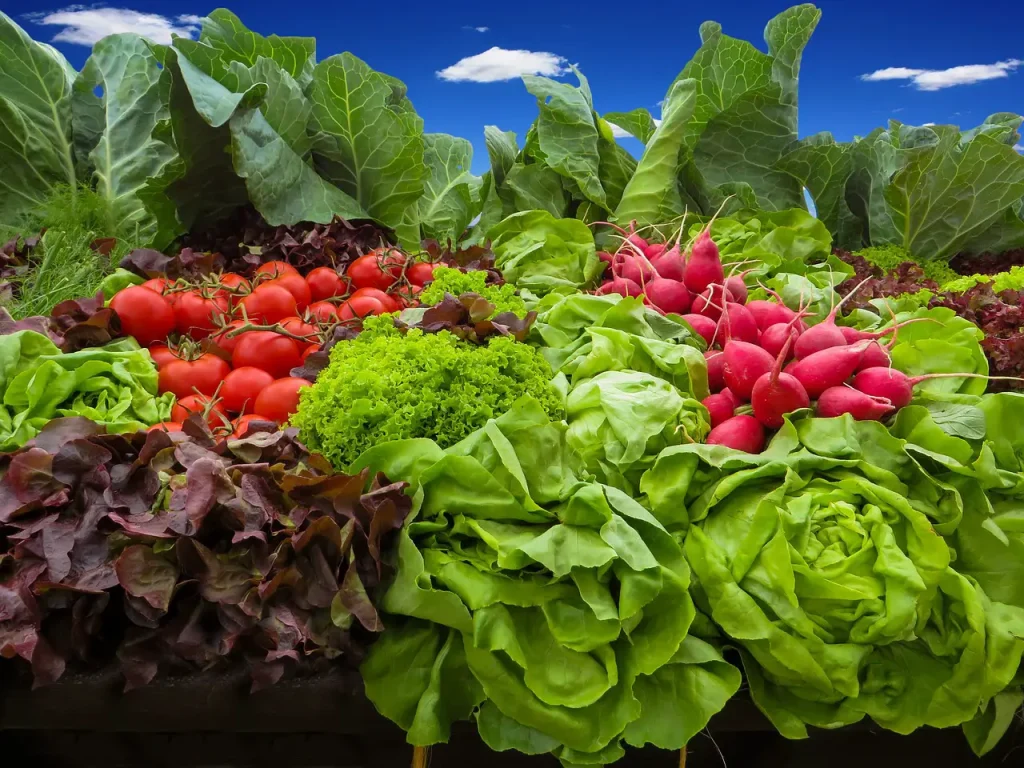
Growing and consuming homegrown fruits and vegetables offers fresh, nutritious produce, boosts your diet, and encourages healthy eating habits all year long. Let’s explore these benefits.
- Fresh and Nutritious: When you grow your own vegetables, you’re more likely to eat a healthier diet. Homegrown produce is often fresher and more nutritious than store-bought options.
- Nutritional Benefits: Different vegetables offer various health benefits:
- Tomatoes: High in vitamin C and potassium, with antioxidants like lycopene that may reduce cancer risk.
- Peppers: Contain capsaicin, which has anti-inflammatory properties and can reduce heart disease risk.
- Spinach: Packed with nutrients like vitamin A, vitamin C, and iron, boosting your immune system and overall health.
- Encourages Healthy Eating Habits: Growing your own food encourages you to include more fruits and vegetables in your diet, promoting healthier eating habits.
By gardening year-round, you’re not just growing plants; you’re cultivating better health for yourself too.
2. Mental Health Benefits
Gardening year-round doesn’t just benefit your body; it does wonders for your mind too.
Engaging with your garden can reduce stress, lift your mood, and sharpen your cognitive abilities.
Let’s explore how this soothing hobby can improve your mental well-being.
Stress Reduction
Gardening is a fantastic way to unwind and relieve stress, allowing you to escape daily pressures.
Gardening as a Form of Stress Relief
- Natural Stress Buster: Gardening helps melt away stress as you connect with nature, providing a peaceful and relaxing environment.
- Physical Activity: Engaging in physical tasks can release endorphins, which are natural stress relievers.
The Therapeutic Routine of Gardening Activities
- Repetitive Tasks: The rhythmic nature of gardening tasks, such as weeding and watering, can have a meditative effect.
- Sense of Accomplishment: Completing small tasks in the garden can provide a sense of achievement and satisfaction, reducing overall stress.
Mood Enhancement
Spending time in your garden can significantly boost your mood, making you feel happier and more content.
Connection Between Gardening and Improved Mood
- Exposure to Nature: Being surrounded by plants and flowers can elevate your mood and provide a sense of peace.
- Mindfulness: Gardening encourages mindfulness, helping you stay present and focused on the task at hand.
Reduction in Anxiety and Depression Symptoms
- Therapeutic Effects: Studies show that gardening can lower levels of cortisol, the stress hormone, reducing anxiety.
- Routine and Structure: Having a regular gardening schedule can provide structure and purpose, which is beneficial for mental health.
Cognitive Benefits
Gardening keeps your mind active and engaged, which helps maintain cognitive health and sharpness.
Gardening’s Role in Preventing Cognitive Decline
- Mental Stimulation: Planning and maintaining a garden involves problem-solving and creativity, which keeps your brain engaged.
- Learning and Adaptation: Gardening often requires learning new skills and adapting to changes, which can help keep your mind sharp.
Impact on Memory and Concentration
- Focus: The detailed work involved in gardening can improve concentration and attention to detail.
- Memory Improvement: Remembering plant names, growth patterns, and care routines can help enhance memory function.
3. Emotional and Social Benefits
Gardening year-round doesn’t just boost physical and mental health; it also offers emotional and social rewards.
From a sense of accomplishment to building community connections, let’s explore how gardening can enrich your life in meaningful ways.
Sense of Accomplishment
Gardening gives a profound sense of satisfaction as you see your efforts come to fruition.
Satisfaction from Planting, Nurturing, and Harvesting
- Watching Growth: Seeing plants grow from seeds to mature plants provides immense joy.
- Harvest Rewards: Picking the fruits (or vegetables) of your labor is incredibly rewarding and fulfilling.
Long-Term Projects and Their Rewards
- Continuous Learning: Gardening is a journey of learning and improvement, offering long-term satisfaction.
- Future Planning: Planning for future seasons and seeing those plans come to life brings a deep sense of achievement.
Social Connections
Gardening can be a wonderful way to connect with others and build a sense of community.
Building Community Through Gardening
- Community Gardens: Participating in community gardens fosters relationships with fellow gardeners.
- Gardening Clubs: Joining local gardening clubs or online groups can help you share tips and experiences.
Sharing Produce and Experiences with Neighbors and Friends
- Gift of Produce: Sharing homegrown produce with neighbors and friends strengthens social bonds.
- Gardening Stories: Swapping gardening stories and tips with others creates a shared sense of community.
Connection to Nature
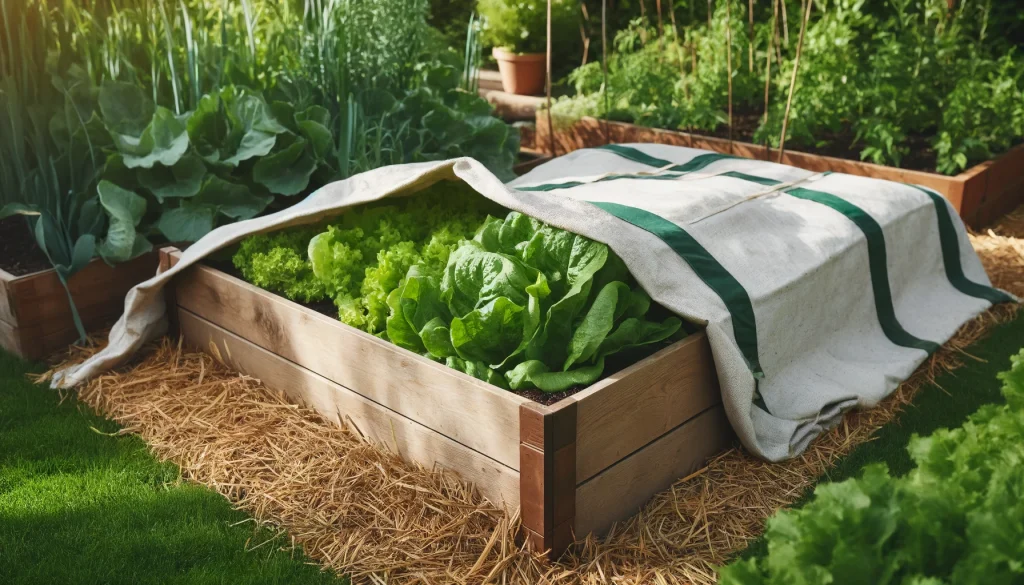
Gardening keeps you in touch with the natural world, providing a peaceful escape from daily life.
Year-Round Interaction with the Natural World
- Seasonal Activities: Gardening activities change with the seasons, keeping you engaged year-round.
- Nature’s Cycles: Observing the natural cycles of growth and rest fosters a deeper appreciation for nature.
Seasonal Changes and Their Impact on the Garden
- Adaptation: Adjusting your gardening practices with the seasons helps you stay connected to nature’s rhythms.
- Environmental Awareness: Year-round gardening increases awareness of environmental changes and their effects.
4. Environmental Benefits
Gardening year-round also brings significant environmental benefits. From promoting sustainability to enhancing biodiversity, your garden can positively impact the planet.
Sustainability
Growing your own food reduces your carbon footprint and supports a sustainable lifestyle.
Reducing Carbon Footprint by Growing Your Own Food
- Less Transportation: Homegrown food cuts down on the need for transportation, reducing greenhouse gas emissions.
- Local Food Supply: Growing food locally decreases reliance on industrial agriculture, which often involves heavy resource use.
Composting and Waste Reduction
Gardening provides an excellent opportunity to recycle organic waste and enrich your soil.
Recycling Organic Waste into Compost
- Compost Benefits: Composting kitchen scraps and garden waste reduces landfill use and creates rich soil for your plants.
- Nutrient Recycling: Composting returns essential nutrients to the soil, promoting healthier plant growth.
Biodiversity
A diverse garden supports various plants and wildlife, contributing to a healthier ecosystem.
Encouraging a Variety of Plants and Wildlife
- Plant Diversity: Growing a mix of plants attracts different pollinators and beneficial insects.
- Wildlife Habitat: Gardens provide habitats for birds, bees, and other wildlife, enhancing local biodiversity.
5. Practical Tips for Year-Round Gardening
Gardening year-round can seem daunting, but with the right approach, it’s entirely manageable. Here are some practical tips to help you keep your garden thriving throughout all seasons.
Planning and Preparation
Planning is key to successful year-round gardening. A well-thought-out plan makes all the difference.
Importance of Having a Gardening Plan
- Guided Efforts: A plan helps you stay organized and ensures you complete essential tasks on time.
- Resource Management: Efficiently manage resources like seeds, soil, and tools, reducing waste and effort.
Adapting Plans to Individual Climate and Soil Conditions
- Climate Considerations: Tailor your gardening plan to suit your local climate, ensuring better plant growth.
- Soil Health: Adjust your soil preparation methods based on the unique conditions of your garden, enhancing productivity.
Consistency and Maintenance
Consistency is crucial for a thriving year-round garden. Regular maintenance keeps your plants healthy and productive.
Daily Garden Walks and 15-Minute Routines
- Regular Check-Ins: Spend a few minutes each day in your garden to monitor plant health and catch issues early.
- Routine Tasks: Consistent small tasks, like weeding and watering, prevent overwhelming garden chores.
Using Monthly Guides for Garden Tasks
- Seasonal Guides: Follow monthly gardening guides to know what tasks to focus on each month.
- Task Management: Breaking down tasks by month helps manage workload and ensures timely garden care.
Season-Specific Tips
Knowing what to plant and when is essential for year-round gardening success. Use these season-specific tips to guide you.
What to Plant and When: A Month-by-Month Guide
- Seasonal Planting: Plant appropriate crops for each season to maximize growth and harvests.
- Rotating Crops: Rotate your crops to maintain soil health and prevent pest buildup.
Utilizing Cold Frames, Greenhouses, and Other Tools
- Extended Growing Seasons: Use cold frames and greenhouses to protect plants from extreme weather and extend your growing season.
- Plant Protection: Employ row covers and other tools to shield plants from pests and temperature fluctuations.
6. Overcoming Challenges
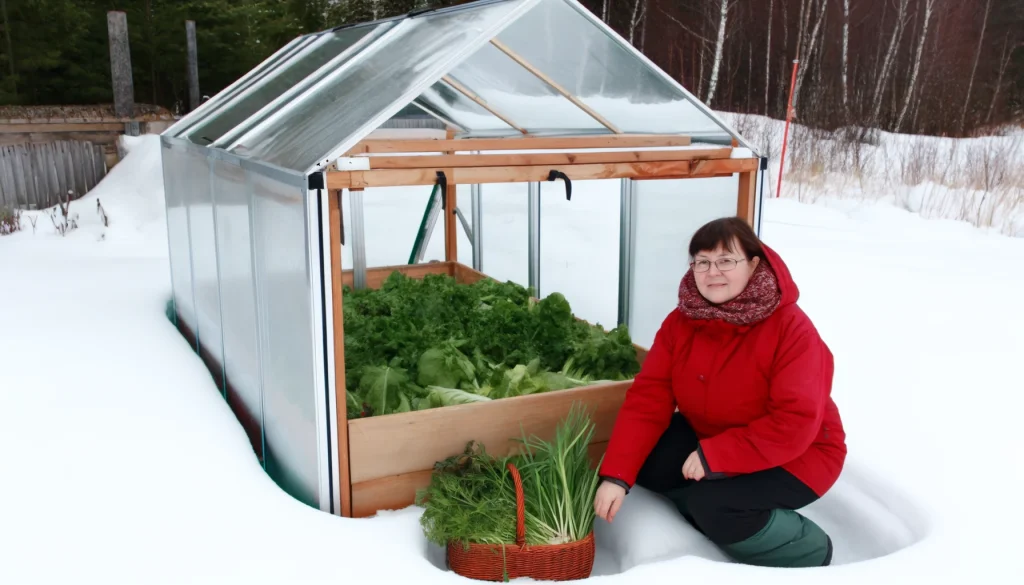
Gardening year-round can present various challenges, but with the right strategies, you can tackle them effectively.
Here are some tips to help you overcome common obstacles and leverage innovative solutions.
Common Obstacles
Gardening throughout the year means facing a variety of challenges, from weather extremes to persistent pests.
Dealing with Weather Extremes
- Heat and Cold: Protect plants from extreme temperatures by using shade cloths during heat waves and frost blankets during cold snaps.
- Wind and Rain: Use windbreaks and proper drainage systems to shield your garden from strong winds and heavy rains.
Pests and Diseases Throughout the Year
- Seasonal Pests: Different pests become prevalent in different seasons. Regular monitoring and timely intervention can keep them at bay.
- Disease Management: Rotate crops and practice good garden hygiene to prevent the spread of diseases.
Solutions and Innovations
Adopting new techniques and tools can help you maintain a productive garden all year round.
Techniques for Extending the Growing Season
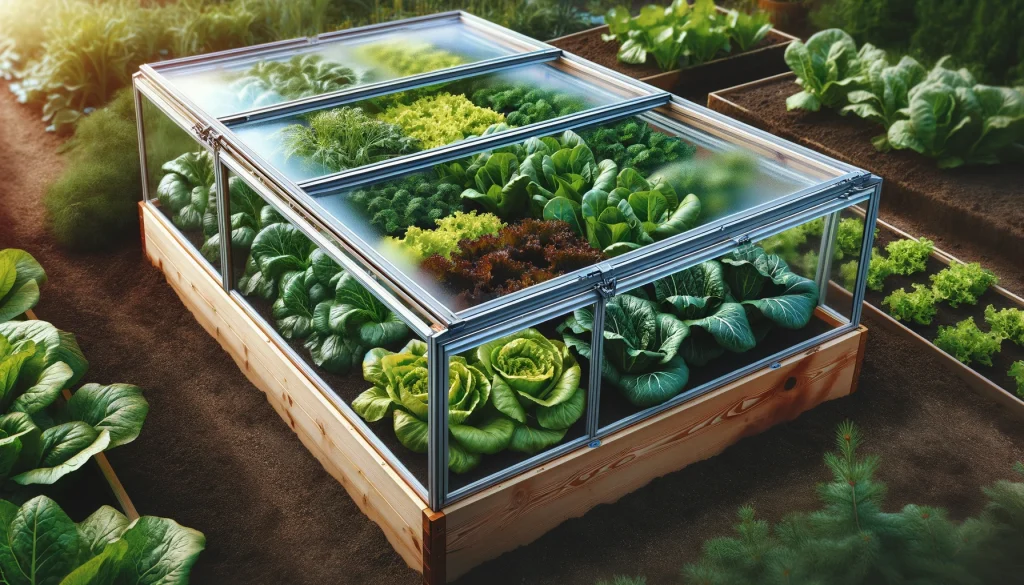
- Cold Frames and Greenhouses: Use these structures to start plants earlier in the spring and extend the growing season into the fall and winter.
- Row Covers and Mulch: Protect young plants from frost and help retain soil moisture with row covers and mulch.
Tips for Indoor Gardening During Harsh Weather
- Indoor Setups: Set up indoor growing systems, like hydroponics or container gardening, to grow plants during extreme weather conditions.
- Lighting and Temperature Control: Ensure adequate lighting and maintain optimal indoor temperatures to support plant growth.
FAQs about Year-Round Gardening
Gardening year-round can seem like a big commitment, but with some practical advice and tips, you can enjoy the benefits all year.
Here are some common questions to help you get started and keep your garden thriving through every season.
Q: Is year-round gardening too much work?
A: Year-round gardening doesn’t have to be overwhelming. By setting manageable routines and staying consistent, you can enjoy continuous harvests without feeling overburdened. Simple daily tasks and planning can make year-round gardening easy and rewarding.
Q: What can I grow in winter?
A: In winter, focus on hardy vegetables and herbs like kale, spinach, carrots, and lettuce. These plants thrive in colder temperatures and can be grown in cold frames or greenhouses to protect them from extreme weather.
Q: How do I start a year-round garden?
A: Begin by planning your garden layout and selecting crops that can grow in different seasons. Start small with a few cold-hardy plants, and gradually expand as you gain confidence. Using tools like cold frames and greenhouses can help extend your growing season.
Q: How can I protect my plants from extreme weather?
A: Use cold frames, hoop houses, and greenhouses to shield your plants from harsh conditions. Mulching and row covers also provide insulation and protect against frost and wind.
Q: What are some tips for indoor gardening during harsh weather?
A: For indoor gardening, ensure you have adequate lighting and maintain optimal indoor temperatures. Hydroponic systems and container gardening are excellent ways to grow plants indoors when outdoor conditions are unfavorable.
Q: How do I manage pests and diseases year-round?
A: Regularly monitor your plants for signs of pests and diseases. Use organic pest control methods like neem oil and introduce beneficial insects to your garden. Rotate crops and maintain good garden hygiene to minimize issues.
Gardening year-round is a rewarding endeavor that brings fresh produce and beautiful plants into your life all year long. With the right knowledge and tools, anyone can maintain a thriving garden through every season.
Benefits of Gardening Year-Round Conclusion
Gardening year-round is a rewarding journey, offering numerous benefits for your body, mind, and soul.
Let’s wrap up what makes it so worthwhile and encourage you to keep your garden flourishing through every season.
Read more: 6 Benefits of Gardening: Gardening’s Big Payoffs
Recap of the Benefits of Year-Round Gardening
Gardening year-round provides:
- Physical Health: Keeps you active, and improves balance and strength.
- Mental Health: Reduces stress, enhances mood, and sharpens cognitive skills.
- Emotional and Social Rewards: Offers a sense of accomplishment and builds community connections.
- Environmental Impact: Promotes sustainability and biodiversity.
Key Takeaways
- Year-round gardening benefits your physical and mental health.
- It provides a sense of accomplishment and fosters community connections.
- Sustainable practices and biodiversity are promoted through continuous gardening.
- With proper planning and consistency, anyone can maintain a thriving year-round garden.
Encouragement to Start or Continue Gardening Through All Seasons
Whether you’re just starting or have been gardening for years, embracing year-round gardening can transform your experience.
Don’t be intimidated by the idea of maintaining your garden all year long; with the right planning and consistency, it’s easier than you think.
Final Thoughts on the Personal and Communal Joy of Gardening
Gardening isn’t just about growing plants; it’s about nurturing yourself and your community. Sharing produce, stories, and experiences with others can create strong bonds and lasting memories.
Read more about getting started for beginners
The joy of watching your garden thrive through every season is truly unmatched. Keep it green and enjoy the countless rewards of gardening year-round!
Resources for Year-Round Gardening
Gardening year-round can be a fulfilling and productive hobby, but it requires knowledge and resources to get the most out of your garden in every season.
Here are some great resources that provide valuable insights and tips to help you succeed in year-round gardening.
- Penn State Extension: Year-Round Gardening Video Series
- This video series from Penn State Extension covers various aspects of gardening throughout the year, including seasonal considerations, planning, and practical advice. It’s a comprehensive resource for both beginners and experienced gardeners.
- Watch the Year-Round Gardening Video Series
- NC State Extension: Vegetable Gardening – A Beginner’s Guide
- This guide offers detailed advice on planning for year-round vegetable gardening, including succession planting and crop rotation. It also provides tips on maintaining soil health and managing pests.
- Read the Beginner’s Guide to Vegetable Gardening
- University of Wisconsin Horticulture: Extending the Garden Season
- This article provides practical tips on using cold frames, hoop houses, and other tools to extend your gardening season. It also includes information on managing pests and diseases year-round.
- Learn About Extending the Garden Season
- Penn State Extension: Home Gardening Resources
- This resource offers a wealth of information on home gardening, including how to select, grow, and harvest vegetables, manage pests, and improve soil health. It’s a great starting point for anyone looking to garden year-round.
- Explore Home Gardening Resources
- UMN Extension: Gardening in Small Spaces
- For those with limited space, this guide provides tips on maximizing your gardening area, choosing the right plants, and practicing succession planting to ensure a continuous harvest.
- Get Tips for Gardening in Small Spaces
By utilizing these resources, you can enhance your year-round gardening practices, ensuring a productive and enjoyable experience in every season.
Visit my Amazon Influencer Page for videos and gardening products Grow Your Own Garden

